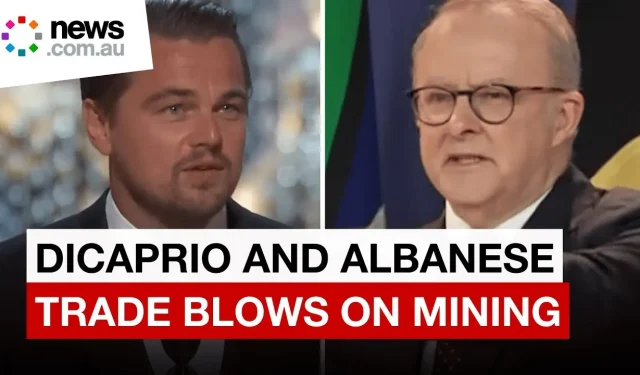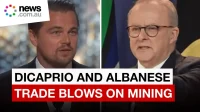Introduction to the Dispute
The recent clash between Australian Prime Minister Anthony Albanese and renowned actor and environmental activist Leonardo DiCaprio has ignited discussions around mining policies in Australia. The dispute escalated when DiCaprio publicly criticized the Albanese government for approving the expansion of a bauxite mining operation in Western Australia. This particular project has raised concerns among environmentalists regarding its implications on local ecosystems and Indigenous land rights.
DiCaprio’s Criticism of Australian Government
Leonardo DiCaprio took to social media to express his discontent with the government’s decision, framing it as a detrimental move for the environment. He argued that expanding mining operations would exacerbate climate change issues and threaten biodiversity. DiCaprio’s vocal stance reflects a growing trend among celebrities who leverage their platforms to advocate for environmental issues, reminding their followers of the ongoing global conversation about sustainable practices in industries such as mining.
Albanese’s Response
In response, Prime Minister Albanese defended the government’s actions, emphasizing the economic benefits of mining for Australia. He articulated that such projects create jobs and generate revenue essential for national growth. Albanese dismissed DiCaprio’s interference as uninformed, suggesting that the actor was out of touch with the realities faced by Australians who rely on mining for their livelihoods. This discourse reflects a broader national debate balancing economic interests against environmental protection.
Environmental and Economic Implications
The conflict highlights a vital issue in Australia’s policy-making, where economic development often intersects with environmental concerns. As the government pushes forward with mining projects to stimulate economic recovery post-pandemic, the backlash from environmental advocates and celebrities brings attention to the potential short- and long-term consequences of such decisions. The bauxite mine expansion, particularly, poses risks to native habitats and may infringe on the rights of Indigenous communities who view these lands as sacred.
Public Reaction and Future Perspectives
Public opinion on the matter appears divided, with many supporting DiCaprio’s fight for environmental justice, while others back the government’s economic strategy. The unfolding developments could catalyze further protests and discussions around legislative reforms regarding mining in Australia. Stakeholders from various sectors, including environmental NGOs and mining companies, are watching closely as both sides of the debate continue to vocalize their positions.
Conclusion
This exchange between Albanese and DiCaprio not only reflects a clash of opinions but also underscores the complexities involved in balancing economic growth with environmental stewardship. As debates about climate change intensify, the outcomes of this confrontation could influence not just future mining policies but broader public sentiments regarding environmental responsibility in Australia.


